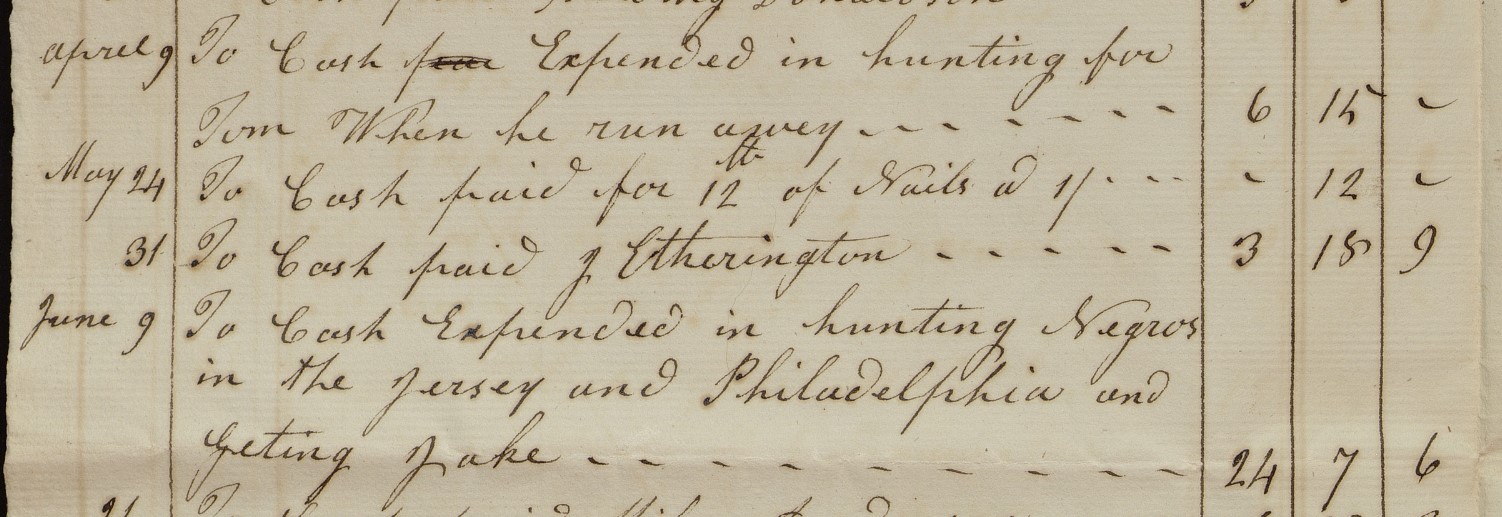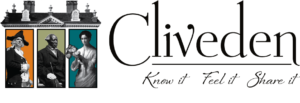In our first foray into the Chew Family Papers, members of the African American Genealogy Group noticed some tantalizing tidbits about freedom seeking behaviors among the Chew family’s enslaved communities. For example, the following document, Accounts for money laid out by Samuel Chew Farms in Cecil County, 1803 [ID: 18361], shows that 6 pounds and 15 shillings were spent on April 9, 1803 “in hunting for Tom When he run away.” Just two months later, on June 9th, another 24 pounds, 7 shillings, and 6 pence were spent “in hunting Negroes in the Jersey and Philadelphia and getting Jake.”

These weren’t the only examples of freedom-seekers in the records. Documents 18266, 18280, 18383, 18398, 18411, all contain one or more instances of an enslaved man – or woman! – seeking their freedom, or perhaps simply some time away, from the Chew family or their associates. But what was interesting was that one name turned up multiple times: Jacob, or Jake.
We weren’t sure at first that Jacob and Jake were the same person – in our first pass of the documents we weren’t looking at materials in chronological order, and it wasn’t unusual for a name to repeat or for two or more people to have similar names. But placing materials in their correct order, and reading each document more closely made it clear that Jake and Jacob were the same person, and that his story was worth exploring.
So, we first encountered Jake in that accounting record from June 9, 1803. He showed up again in a letter from Benjamin Chew to Samuel Chew, written on the very same day:

It reads, in part, “Jacob on appearing before the Mayor owned he was your Slave but aledged he had a wife in this City & wished to be sold to a Butcher who was willing to purchase him but on my informing the Mayor you had not given any authority to sell him he sent him back to Gaol & gave written orders to the keeper to deliver the fellow to Etherington to be conveyed to you as his Slave…” [ID: 18410]
But Jake appears in an earlier record, as well, a letter from May 26, 1803 [ID: 18412]. In it, Benjamin Chew, writing to Samuel, gives us insight into the beginning of this story. He writes,
“A person named John Etherington…came to me last Monday & informed me that Berry your overseer knowing he was coming to this city with power from several Persons to take up some of their runaway persons requested him to arrest & secure any of yours if he should meet with them; at the same time Etherington show’d me a warrant he had just obtained from the Mayor to arrest one of your Negro men call’d Jacob, who he knew perfectly & had run away some years ago from Rich Neck. The fellow was this morning apprehended…”

He is also mentioned in 2 paper slips – receipts or other notes – regarding payment between James Berry and John Etherington for Jacob’s capture, one dated May 31, 1803, the other June 25, 1803.
If you place this information on a timeline, it looks something like this:
- “Some Years Ago”: Jacob seeks his freedom.
- Week of May 16 or 23, 1803: Etherington receives a warrant for Jacob’s arrest from the Mayor of Philadelphia.
- May 16 or 23, 1803: John Etherington speaks w/ Benjamin Chew in Philadelphia re: capturing Jacob.
- May 26, 1803: Jacob is captured and placed in jail for 29 days. Benjamin writes to Samuel about the story to date.
- May 31, 1803: Etherington is paid by James Berry for having Jacob captured and jailed.
- June 9, 1803: Samuel Chew notes in his ledger that he has spent money on “geting Jake.” Benjamin writes to Samuel that Jacob was brought before the Mayor that morning and ordered to be returned to Samuel.
- June 25, 1803: Etherington is paid an additional fee for Jacob’s capture.
The records that build this story are the only ones we noted during our research in the Chew Family Papers to date, but who knows what else might be buried within the files? How did Jacob come to be with the Chews? What caused him to seek his freedom? What might other records, outside the Chew Family Papers tell us about his time in Philadelphia? And what became of him when he was returned to the Chew family?
We don’t have answers to these questions, but perhaps you’ll find them. To start, visit the Illuminating Hidden Lives digitized records at https://omeka.hsp.org/s/digitalcollections/page/Illuminating-Hidden-Lives; start your search using “Jacob” and “Jake.”
Illuminating Hidden Lives: Black Stories of the Mid-Atlantic Region was funded by the National Trust for Historic Preservation's Interpretation and Education Endowed Fund that was made possible by a challenge grant from the National Endowment for the Humanities.


Learn more about Illuminating Hidden Lives!
Click the button below to learn about and watch program recordings for our current project with the African American Genealogy Group and the Historical Society of Pennsylvania.

